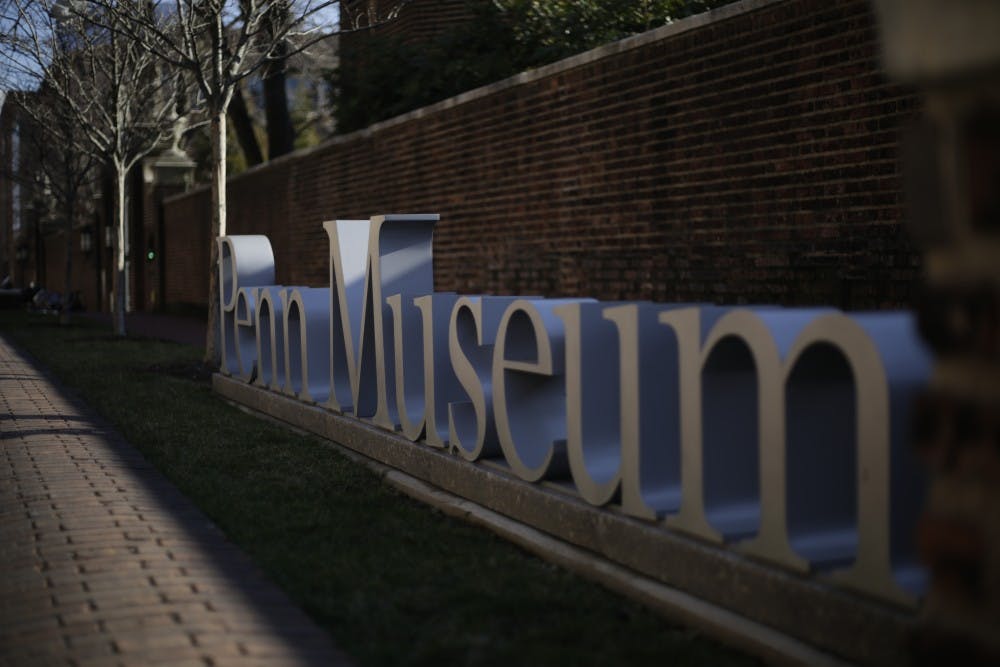Whether it's through conversations with esteemed professors, exploring expansive academic databases, or reflecting on a wide array of historical artifacts at the Penn Museum, Penn students have a wealth of academic resources to learn about global cultures.
Now, however, the University Museum of Archeology and Anthropology is adding a personal touch to this educational experience with the museum’s new Global Guides program.Through this program, visitors will have an opportunity to learn firsthand from tour guides born and raised in the very regions discussed in the museum.
Penn’s inaugural Global Guides Program launched in late April. It features three tour guides from Iraq and one from Syria, each of whom leads visitors through the museum’s new Middle East Gallery. There, the tour guides present ancient displays in a unique, contemporary context, connecting ancient artifacts to their own cultural experiences in their home countries.

Abdulhadi Al-Karfawi is one of the museum’s global guides. A geography graduate of the University of Baghdad and previous employee at a UN mission, Al-Karfawi recently emigrated with his family from Iraq. Last July, he was connected with the Penn Museum through HIAS, an organization that helps protect and resettle refugees, and was offered a Global Guide position several months later.
“I honestly thought I was never going to get a job that I always dreamed about, which is this museum job,” Al-Karfawi said. “As soon as I heard about the job, I was like, 'This is the chance for me to live in the U.S. and be close to my heritage.”
On his tours, Al-Karfawi frames the Middle East collection with accounts of his heritage. While discussing different artifacts, he likens them to items and sites in his native Iraq, especially Samara, one of the country’s five World Heritage Sites. He also said he likes how displays resonate with his cherished family memories.

Related:
Student exhibit at Penn Museum traces evolution of storytelling and cultural innovation
Middle East Galleries is first exhibit to open as part of Penn Museum's $102 million campaign
Penn will spend $15.15 million to make Houston Hall the 'new public space on campus'
“When I see those dishes we have in the gallery, I always connect it to my personal family gatherings,” Al-Karfawi said. “We used to gather week to week at one of my sibling’s houses, just to laugh and make jokes about each other, get food, and the food would be served in the dishes like we have in the gallery, which makes me very much feel like this is my home.”
Another display that especially resonates with Al-Karfawi is a cuneiform tablet that details an argument between a father and son over school work.
“As soon as I saw the tablet, I had a spark in my heart,” Al-Karfawi said. “So I called my father, and was like, father, dad, I just saw something that reminded me of when I used to give you a hard time, so I’m very sorry and I love you.”
Penn Museum Education Programs Manager Kevin Schott cited Al-Karfawi’s intimate connections to the exhibit as exactly what the Global Guides program aims to give visitors.
“When you see an artifact that’s 5000 years old, you don’t always connect with it,” Schott said. “It seemed logical to hire people who could actually make those connections, who could say ‘I saw something like this when I was growing up,’ or ‘I was in a situation similar to this ancient person because I’m from the same place.’”

Al-Karfawi said that he hopes that his tours not only make history more exciting but also provide visitors and students with perspectives of the Middle East that are more holistic than those often portrayed in common media.
“Iraq is not just a desert, it is not just the [Islamic State],” Al-Karfawi said. “It has many different facets.”
Temple student Maria Maltepes said she deeply appreciated the broader perspective Al-Karfawi offered on his tours. She added that the tour complemented what she had seen during her recent trip to Israel, giving her a wide, individualized view on different Middle Eastern cultures.
“I like how he put such a personal approach into it,” Maltepes said of Al-Karfawi. “It makes it so much more humanistic to me; not just looking at display cases but actually hearing a story.”
Soon, students will have an opportunity to hear such stories about other cultures. By September 2019, the current global tour guides will be joined by others from Mexico, Central America, and Africa.
Schott said he’s excited about how these tours can impact students and other visitors who come to the Penn Museum.
“It puts context with the ancient artifacts,” Schott said. “It really helps the history come alive.”



